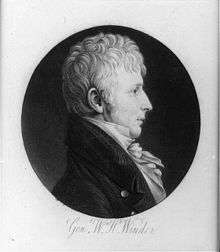William H. Winder

William Henry Winder (1775 – 1824) was an American soldier and a Maryland lawyer. He was a controversial general in the U.S. Army during the War of 1812.
Early life
Winder was born in Somerset County, Maryland. He was the nephew of Levin Winder. He graduated at the University of Pennsylvania, and from 1798 to 1812 practiced law in Baltimore.[1]
War of 1812
Winder was commissioned as a colonel in the U.S. Army at the start of the War of 1812. Promoted to brigadier general, he was one of two acting commanders of the American army at the Battle of Stoney Creek in July 1813, where he was captured, along with fellow commander John Chandler.
Battle of Bladensberg
Exchanged the following year, Winder was appointed commander of the new 10th Military District, which composed the defenses of Washington and Baltimore, by fourth President James Madison on July 4, 1814. He received little logistical support from the government, especially Secretary of War Armstrong who received much blame for the upcoming disaster and was later fired. In August, the British Maj. Gen. Robert Ross with several thousand troops advanced from the Royal Navy ships anchored in the upper Patuxent River at Benedict, Maryland (in Prince George's County) upon Washington along with a simultaneous small naval expedition under Capt. James Gordon up the Potomac River to attack the port at Alexandria, (then in the southeast corner of the ten-mile square District of Columbia, previously and later returned to the Commonwealth of Virginia), and provide naval support to Ross's troops once they reached the American capital, across the river to the northwest. Winder had only a few hundred regulars, and a mob of some thousands of two state and District militia units to oppose them. He made no attempt to skirmish or slow down the advancing British and decided on an all-or-nothing set piece defensive battle at Bladensburg. The Americans met the British at the Battle of Bladensburg on August 24, 1814. He failed to show effective command in the battle, although he received virtually no support from the newly designated Secretary of War and continuing Secretary of State, James Monroe (later fifth President), actually interfered with his command by repositioning some of the militia regiments, which may have had a significant contribution to the ensuing rout. He clearly did not support U.S. Naval Commodore Joshua Barney's second line at the center of the American forces along the Washington-Bladensburg Road that actually repulsed the 85th Regiment of Foot after the rout of the American first line following the Red Coats crossing under fire of the small creek of the Eastern Branch of the Potomac River (now the Anacostia River). As a result of the battle, the rough unfinished national capital fell easily into the hands of the invaders who marched in that evening looking for some authorities to surrender the town. Winder was afterward court-martialed, but was acquitted of all blame.[1]
After the debacle of Bladenburg, Winder was quickly maneuvered by the skittish Baltimoreans' municipal, business and military leaders out of having any significant command at Baltimore in favor of the highly competent Samuel Smith, a former Revolutionary War officer and commander, wealthy city merchant and shipper, former U.S. Representative, then Senator for Maryland (later in life elected Mayor of Baltimore) and so was relegated under protest to the command of limited troops on the southwestern and western approaches to Baltimore which were not considered a likely route for the British naval and military attack from the Chesapeake Bay to the east. Winder would have participated in the possible battle at the extensive dug-in fortifications (planned and supervised by Smith in a fortunate premonition and foresight) on "Loudenschlager's Hill" and "Hampstead Hill" (now site of Patterson Park in East Baltimore) on the eastern heights from the City had the British decided to carry forward to the attack and had the bombardment on Fort McHenry on September 13-14, been successful.
Later life
Winder also testified at the impeachment trial of Associate Supreme Court Justice Samuel Chase.
One of his sons, John H. Winder, was a brigadier general in the Confederate army during the American Civil War.
References
 This article incorporates text from a publication now in the public domain: Gilman, D. C.; Thurston, H. T.; Colby, F. M., eds. (1905). "article name needed". New International Encyclopedia (1st ed.). New York: Dodd, Mead.
This article incorporates text from a publication now in the public domain: Gilman, D. C.; Thurston, H. T.; Colby, F. M., eds. (1905). "article name needed". New International Encyclopedia (1st ed.). New York: Dodd, Mead.- The Dawn's Early Light, Walter Lord
Notes
| Military offices | ||
|---|---|---|
| Preceded by vacant |
Adjutant Generals of the U. S. Army May 19, 1814-July 2, 1814 |
Succeeded by Daniel Parker |
| Preceded by vacant |
Inspector General of the U. S. Army May 9, 1814-July 2, 1814 |
Succeeded by Daniel Parker |
|